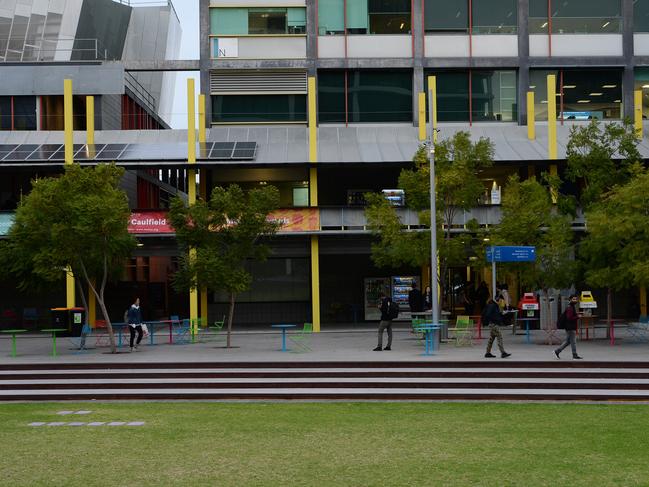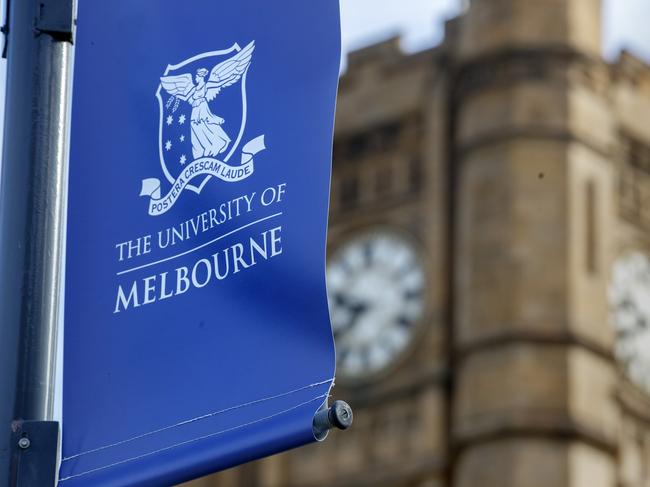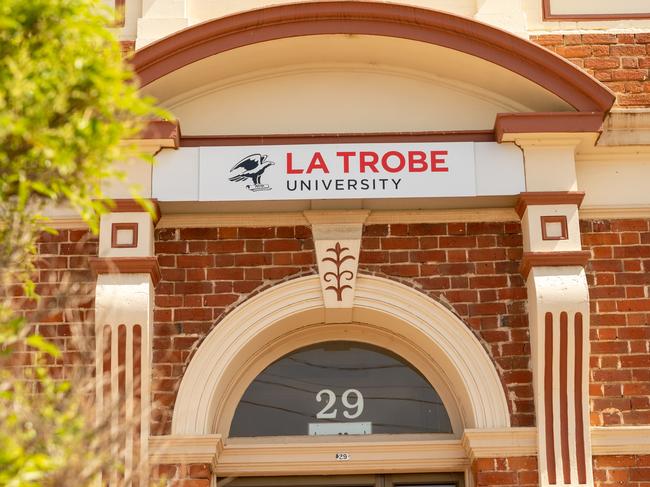Luxury car hire, travel deals and on-site childcare: The perks uni staff enjoy at Victorian universities
Vice-chancellors at some of the state’s top universities are raking in million-dollar salaries while treating their employees to a string of discounts. See the perks enjoyed by university staff.

Tertiary
Don't miss out on the headlines from Tertiary. Followed categories will be added to My News.
Vice-chancellors at some of the state’s top universities are raking in seven-figure incomes while treating their staff to luxury car hire services, travel deals and on-site childcare.
A Herald Sun analysis of employee benefits at eight Victorian universities found discounts on undergraduate and postgraduate courses, cheaper health insurance and access to a range of free programs and technology were among the most common rewards for staff.
Meanwhile, other exclusive staff offerings included superannuation contributions up to 17 per cent, flexible work arrangements and a range of leave options.
But despite the long list of bonuses, the National Tertiary Education Union (NTEU) is calling on universities to close the pay gap between higher management and its general staff, with some vice-chancellors earning six times the salary of professors and lecturers.
NTEU Victorian Assistant Secretary (Academic Staff) Professor Joo-Cheong Tham called for more robust governance arrangements in relation to vice-chancellors’ pay “including consideration of pegging the salary levels of Victorian vice-chancellors to the Victorian Premier’s salary”.
“There is a spectacular inequity between the wages of frontline university workers and vice-chancellors’ pay with the vice-chancellors of Monash University, RMIT University and the University of Melbourne being paid twenty times more,” he said.
“There is also a gross disparity between vice-chancellors’ pay and those of professors with vice-chancellors’ of Monash University and the University of Melbourne paid more than six times its academic leaders.”
It comes as university students, both current and former, fork out thousands of dollars a year to pay off rising HECS debts and other student loans, with the indexation rate predicted to be at 4 per cent under the federal government’s proposed changes to lower the index rate.
Read on to see how much your vice-chancellor is earning and the staff perks teaching staff enjoy.

Monash University
Newly appointed Vice-Chancellor Sharon Pickering is estimated to be earning an income over a million dollars after her predecessor received between $1,560,000 and $1,569,000 last year, according to the university’s annual report tabled in parliament earlier this month.
Monash University’s vice-chancellor’s earnings were the highest out of eight Victorian institutions in 2023, while in 2022 academic staff at the prestigious university received $197,952 and professional and trades staff salaries started from $51,434.
Staff could earn more this year after the university and NTEU reached a new enterprise agreement, which will provide equitable and competitive pay increases that sum to a total of 17 per cent between December 2022 and June 2026.
The agreement will also improve job security by increasing the number of teaching and research continuing positions and will provide improved options for fixed-term staff to convert to ongoing employment.
As for staff benefits, employees had access to a number of onsite services, including sporting facilities, bookshops, childcare and health services.
They also received travel and tourism discounts, retail and banking benefits, health insurance deals and are invited to attend the Monash Club.
The new enterprise agreement will also enhance existing leave conditions and will support a healthy work-life balance.

University of Melbourne
Australia’s second oldest university also paid the second-highest remuneration total to its vice-chancellor, who last year earned between $1,440,000 and $1,454,999.
Meanwhile, its academic salary was the highest paying with professors paid from $217,805 and its higher education worker income starting from $58,608, according to the university’s 2024 Enterprise Agreement.
“University staff are essential to creating a positive student experience, as is our significant investment in teaching and learning, and student services and support,” a University of Melbourne spokesman said.
“Our enterprise agreement, recently negotiated with the NTEU and agreed by employees, provides our academics with salary increases that retains the University’s position as one of the highest paying employers in the sector, supported by a total package of sector leading benefits.”
Staff also received 25 per cent off full-fee graduate courses as well as study discounts for family members – a huge benefit with total course fees at the university ranging from $110,000 to $193,888 depending on the subject.
Other bonuses included subsidised on-site childcare, discounts for health services and access to sports facilities, while female staff and managers can access training to support career progression.

Swinburne University of Technology
Victoria’s third highest paid vice-chancellor last year is understood to be Swinburne University of Technology’s Professor Pascale Quester, who received between $1,040,000 and $1,049,999.
The university appeared to have the lowest rate of casual employees, meaning most of its staff felt they were in secure work – a trend not as widely seen at some other institutions.
As for staff perks, Swinburne staff not only had access to career development opportunities and flexible working arrangements, but also received discounts for health and wellbeing services including counselling, private health insurance and weekly yoga and pilates classes.
They also got cheaper annual myki cards, travel and car hire, movie tickets and technology discounts.
Deakin University
Academic and professional staff at Deakin University both received the second-highest annual incomes compared to other Victorian institutions, starting from $204,256 and $55,105 respectively.
Meanwhile, the university’s vice-chancellor’s earnings ranked fourth highest, and was estimated to receive between $1m and $1,099,999.
Staff at the university not only received relatively generous starting salaries but also had access to seven annual leave options including recreation and cultural leave, as well as flexible work arrangements, banking packages, health insurance and IT and mobile phone offers.
Despite the staff benefits, the university recorded a slight increase of 2.52 per cent in the number of staff who said they felt their roles were insecure between 2022 and 2023, according to a NTEU analysis of annual reports.

RMIT
While RMIT’s starting salary for academic and teaching staff was on the lower end of the scale compared to its counterparts, staff got some great perks, including automotive benefits with brands such as Audi and Mercedes-Benz.
According to the university’s website, employees had access to several financial, social, technology, transport and travel benefits – similar to other universities.
RMIT’s Vice-Chancellor also received a moderate annual remuneration package last year at the seven-figure mark, and was estimated to have received between $1,000,000 and $1,009,999.
Staff are still continuing to bargain for a better pay deal and working conditions after the Higher Education Enterprise Agreement expired more than 1000 days ago.
Meanwhile, the Vocational Education Enterprise Agreement expired more than 840 days ago.
La Trobe University
While La Trobe University’s Vice-Chancellor was paid an annual income on the lower end of the scale – between $960,000 and $970,000 – its professional staff had the third-highest starting salary of $53,260.
The university was also among a small number of institutions which recorded a decrease in the number of staff who felt insecure in their jobs.
In addition to staff and family discounts for a range of La Trobe University courses, employees got access to childcare facilities, flexible work arrangements and 17 per cent employer contribution to superannuation.

Victoria University
The university’s fourth Vice-Chancellor Adam Shoemaker earned between $840,000 to $849,999 last year, the second lowest annual income for a university chief in Victoria.
Meanwhile, professors received an estimated starting salary of $193,038 while professional staff earned from $49,993.
Similar to other institutions, Victoria University offered its staff discounts for undergrad and postgrad courses, professional development opportunities, health and wellbeing services, access to childcare and parenting rooms and purchased leave arrangements.
Federation University
Federation University’s Vice Chancellor may have been the lowest paid last year – with a salary ranging between $740,000 and $749,999 – but staff received starting salaries on the higher end of the scale compared to other institutions.
Professors earned an income starting from $197,980 last year while professional staff earned from $52,857.




